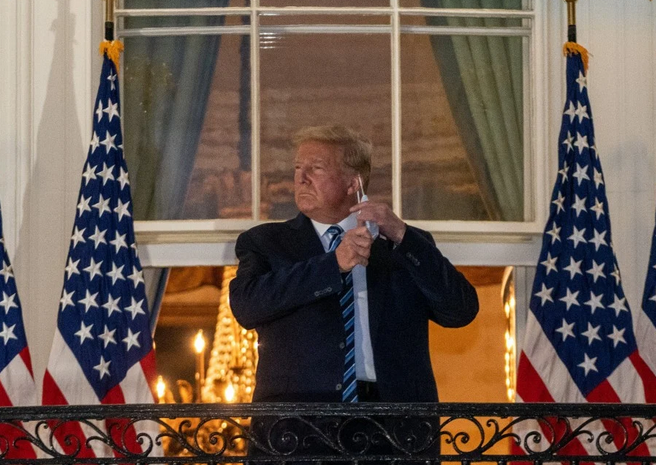Trump Has Made ‘The Question’ so Much Easier to Answer
It’s a question that once derailed a presidential contender and has launched countless, carefully calibrated responses. This time, there’s an overwhelmingly obvious answer.

Lisa Van Dusen
October 14, 2020
It hasn’t come up yet in this presidential election cycle, possibly because the answer seems so overwhelmingly self-evident, but it’s status as a quadrennial ritual is so baked into US political culture that, in the West Wing episode in which it figures prominently, it enters the action as simply, “The Question”.
The Question is, “Why do you want to be president?” It attained mythical status in 1979 after it stumped Senator Ted Kennedy so stunningly when Roger Mudd asked it during a CBS News interview that it effectively ended his primary challenge against incumbent Democratic President Jimmy Carter.
Ever since, presidential candidates have had answers at the ready for The Question, presumably — in some cases — an assortment of them adjusted for questioner, state in which the question is asked and latest attitudinals.
In any presidential election since that moment in 1979 when Kennedy took an odd, cosmic pause before launching into a viability-deflating readout of America’s CIA Factbook country profile, The Question has been a double-barrelled test. First, does the person being asked know enough to have prepared for it, i.e. is their staff competent enough to have flagged it as a thing and therefore competent enough to win a campaign. Second, what’s their answer?
The reason you can’t remember what any subsequent presidential candidate answered when asked The Question is that nobody else made it as memorably significant, ever again. Nobody ever gave an egregiously wrong answer or fumbled it on national television because they had the benefit of an epic cautionary tale (which, ultimately, seemed to lift an enormous weight from the shoulders of Ted Kennedy).
In this presidential election, for the first time in decades, the correct answer to The Question for the current front-runner — it’s not an incumbent question since the incumbent is already president — is indisputably, incontrovertibly obvious: “To save the country.”
The last time in US history that answer would have sounded anything but hyperbolic at best and narcissistic at worst would have been coming from Franklin Delano Roosevelt running against Herbert Hoover in 1932, promising to end the Great Depression.
In this election, with the United States under siege by a president who has exploited every previously unturned corruption stone of the office; abused every power of the title to diminish and discredit his own country on the world stage; who had already done more reputational damage to American democracy than any enemy ever had before existentially threatening it by refusing to commit to a peaceful transfer of power; saving the country is an entirely plausible reason for Joe Biden to want to be president.
In this presidential election, for the first time in decades, the correct answer to The Question for the current front-runner — it’s not an incumbent question since the incumbent is already president — is indisputably, incontrovertibly obvious: “To save the country.”
With the question of values so starkly drawn between an incumbent who has lied tens of thousands of times; who is the first impeached president to seek re-election; who has embraced white supremacy; used his Twitter account as a racist flamethrower and operationalized his bully pulpit to bully his fellow citizens; and a former vice president who served alongside the first Black American president; whose family has served, loved, lost, mourned, rallied, overcome and thrived along with millions of families who’ve done the same on similar, relatable terms; the answer contains a legitimate moral claim.
With the question of competence so starkly drawn between an incumbent who has, through willful neglect or worse, given the United States the highest COVID-19 death toll of any nation on Earth; leveraged his disruptive personality to serve the interests of America’s geopolitical rivals by undermining multilateralism, attacking the free press, degrading the liberal world order and targeting his political enemies; and a former vice president who presided over the post-Great Recession recovery, helped save the US auto industry and served in the White House that negotiated the Iran nuclear deal, the Paris Agreement and the normalization of relations with Cuba while creating 11.6 million jobs, the answer also contains a legitimate practical claim.
With the question of quality of life so starkly drawn between an incumbent whose divisive, ignorant, fearmongering behaviour has seemed calculated to erode mute buttons and boost anti-depressant, alcohol and marijuana stocks worldwide and an incumbent who behaves like a normal, intelligent, lucid, coherent, responsible, empathetic, other-aware, decent, highly qualified leader, the answer also contains a legitimate change claim that promises a drastic improvement in the quality of hundreds of millions of daily lives. Not just in America but everywhere where democracy is at risk, everywhere with Wi-Fi, everywhere where sentient beings ponder events on a daily basis.
The other day, Democratic Michigan Governor Gretchen Whitmer took time out from being the thwarted-kidnapping target of an apparent narrative warfare militia to tweet the rallying cry to raise your emoji hand if you have a personal stake in this election. Governor, nearly 8 billion people have a personal stake in this election.
Indeed, the truest answer to The Question this time may be, “To save the world,” but that could sound, ironically enough, a little Trumpish.
Saving America would be a good start.
Lisa Van Dusen is associate editor of Policy Magazine and a columnist for The Hill Times. She was Washington bureau chief for Sun Media, international writer for Peter Jennings at ABC News, and an editor at AP in New York and UPI in Washington.
